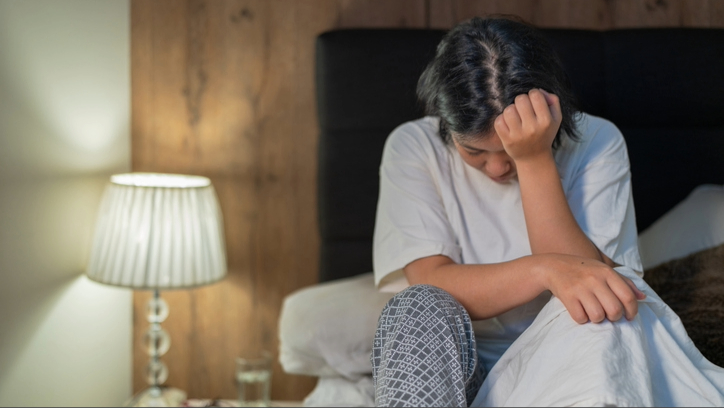According to American Academy of Sleep Medicine12 % of American adults are diagnosed with chronic insomnia, a disorder that makes it difficult to sleep and sleep.
Although insomnia treatment may include drugs, more and more people are turning to CBT-I (academic therapy for insomnia). This form of therapy is designed to solve important roles in insomnia, rather than only drugs.
But how effective is it? We talked Dr. Arch PatharFind out more information after finding your best sleep after the launch of the new CBT -1 sleep program at the University of California at the University of California in San Francisco, and find more information after finding your best sleep after finding out your best sleep. What he told us is …
How does CBT-I work for insomnia?
Dr. Arc says, “Academic therapy for Indira (CBT-I) is an empowered treatment for the quality of gold for insomnia, and should be the first line treatment for Indira victims before starting pharmacological treatment.”
CBT-I also relieves anxiety that develops with unexpected sleep
“Unlike hypnotic drugs, CBT-I runs insomnia, and provides science-backed strategies to improve sleep by improving sleep and preventing their circidine rhythm.
“CBT-I also solves anxiety that develops with unexpected sleep by adding softened techniques and psychological strategies such as psychological strategies such as reorganization.
“The goal is to help patients better manage their sleep, find some success in sleeping, and create confidence and flexibility.”

How different is CBT-I CBT’s other forms?
“CBT-I is especially focused on the symptoms of sleep and insomnia. Unlike other CBT treatment, CBT-I is a lot of behaviors. We know a little bit about what our sleep biologically regulates, so we start from this place.
“After focusing on stimulation control, implementing stimulation control, and focusing on sleeping behavior through sleep diary through sleeping diary, limiting your time in bed to restrict sleep stability, and reduce the disturbances at night and night.
Does CBT-I also help with anxiety?
“CBT-I can definitely improve the symptoms of anxiety. In fact, many clinical trials show that people who are random in CBT-I show a significant decrease in the symptoms of anxiety than those who control the conditions.
“It is not surprising that poor sleep often leaves people more” edge “and restless. Headspace also offers a directive program for anxiety and depression, the CBT for anxiety and depression program, which includes specific CBT techniques to improve the symptoms of anxiety and depression.
“This course has been shown to reduce the symptoms of anxiety and depression, improve sleep quality and have a positive impact on mental health and fitness (currently ready for peer reviews).”
In your experience, are there some people who will find CBT-I more beneficial than others?
“Some people benefit more from CBT-I than others, though a lot of research is needed to clarify these differences.
There is a slightly negative aspect (up to CBT-I), and it is likely to provide you with maximum control over your sleep.
“There is some evidence that less sleepy with Indira.
“This is likely to be because of why CBT -1 is effective for an active mechanism for bed restrictions, which may not be so powerful in a little sleepy.
“In my clinical experience, CBT-I can be less effective in complex psychological or medical offerings.
“In some cases there may be conditions or medicines that are affecting sleep where CBT -1 cannot fully resolve sleep anxiety.”

What will you advise to those who are considering the CBT-I?
“Although CBT-I is a gold standard for the treatment of insomnia, it is not always accessible. The headspace sleep course” Your Best Sleep Finding “was created to increase access to low cost to effective sleep support.
Unlike sleeping medicines, CBT-I has no longer risk
“This course increases access to proven sleep support through a specialist, self -guided sessions, which can be completed at any time, anywhere. With headspace membership, it offers flexibility and cheapness.
“After just 10 minutes a day during the 18 days, this course proved to be medically improved.
“I hope that anyone who is struggling with insomnia will somehow consider the CBT -1 trial.
“Unlike sleeping medicines, CBT-I has no longer risk. In addition, the strategy learned by the CBT-I can be good in the future and sleep can change with our lives.”
Based on your experience, what is the most common cause of Indira in our modern world?
“I doubt that the feelings of stress and uncertainty are most likely to be insomnable. For many people we feel that we are in a state of hyper vigilance, and that results in distressing sleep.
As a result, we often lack emotional resources to deal with stress, which causes another night of sleep.
Thankfully, programs like CBT-I can help provide roadmaps to better manage our sleep, and when combined with stress management strategies, help us deal with this pressure world. “

Finally, what would you suggest a consultation that would make a constant sleep?
“First, I would say that they are not alone. In fact, at least 30 % of adults, if not high, are not getting proper sleep.
At least 30 % of adults, if not high, are not getting proper sleep
“Is your sleep disruption? Are you putting so much pressure for time that you are not giving yourself enough opportunity? The answer to these questions will lead to different solutions.
“If you are upset with your sleep, the first step can be to talk to your doctor to ensure that you are asleep, like sleep deprivation, disrupts your sleep.
“If not and you are looking for a personal point of view, considering CBT -1 through a sleep expert, I always suggest that people seek the Society for Sleep Drug Directory to find someone in their area.”

